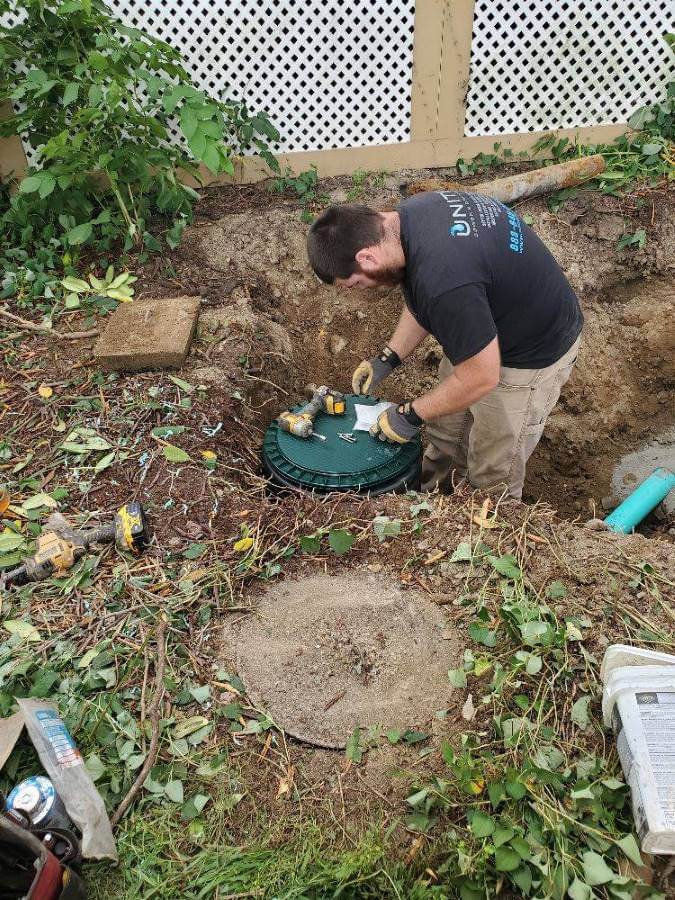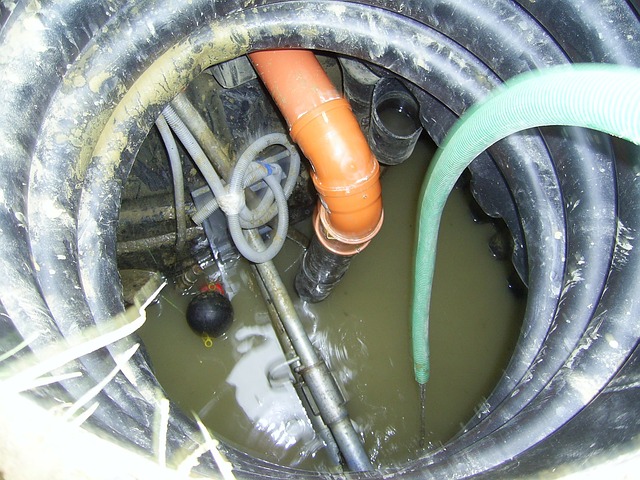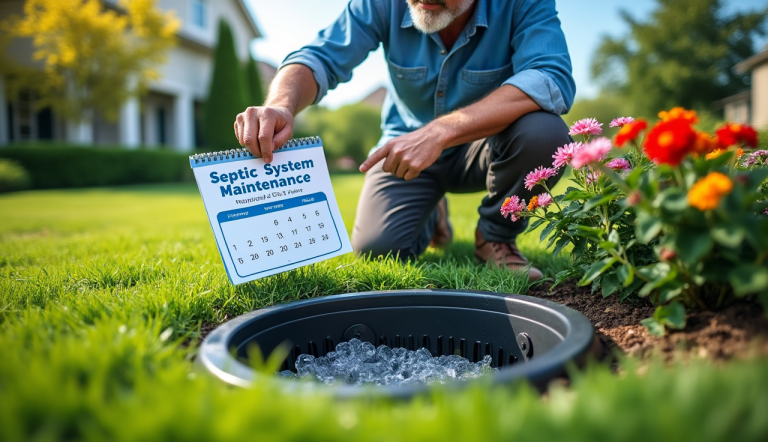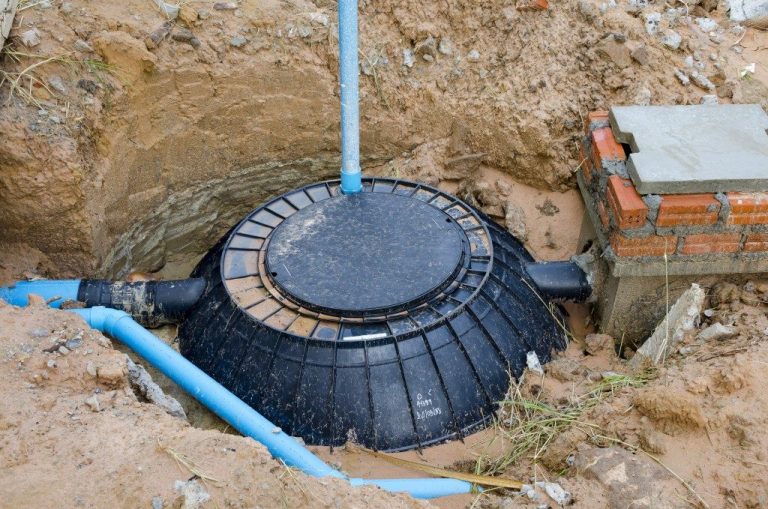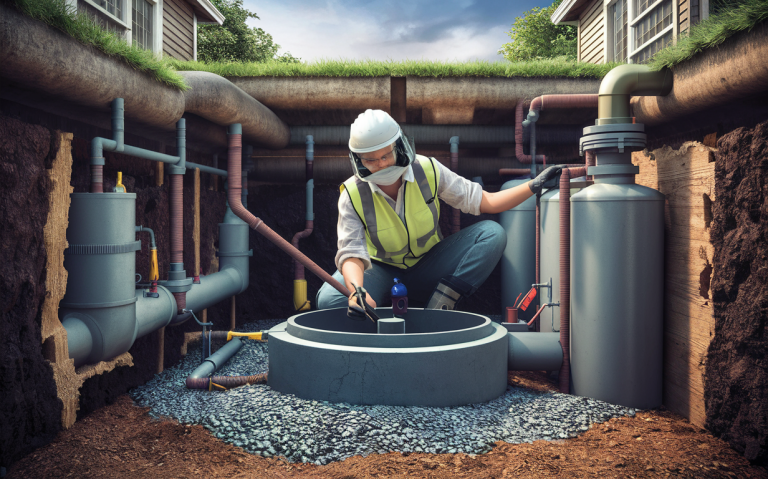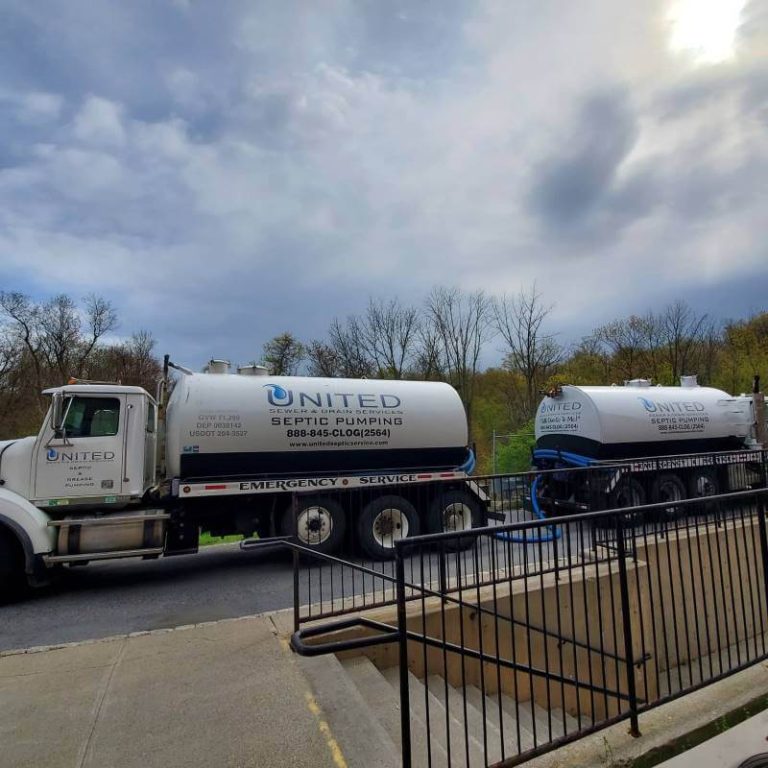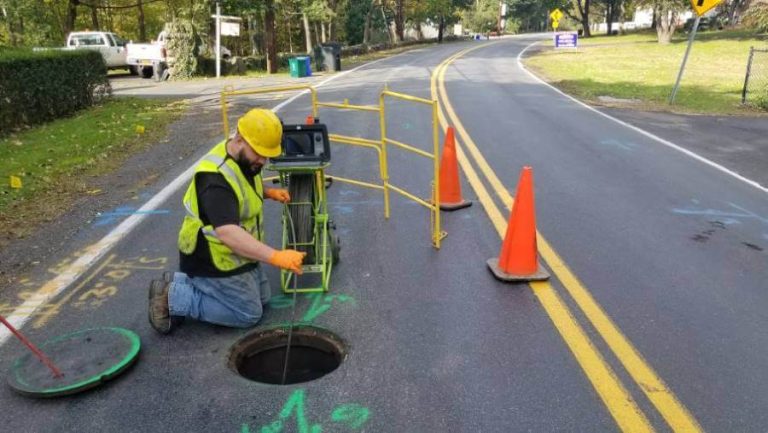Maintaining Proper Waste Decomposition: Septic Care
Maintaining proper waste decomposition is essential for the health and longevity of your septic system. As a septic system owner in Middletown, New York, understanding the basics of waste decomposition can help you avoid costly repairs and ensure your system functions efficiently for years to come.
Table of Contents
Key takeaways
- Regular pumping and inspection of septic tanks is crucial
- Bacteria play a vital role in breaking down waste
- Avoid harsh chemicals that can disrupt the bacterial balance
- Proper water usage helps maintain system efficiency
- Landscaping choices can impact septic system performance
- Professional maintenance is essential for long-term system health
The Importance of Maintaining Proper Waste Decomposition
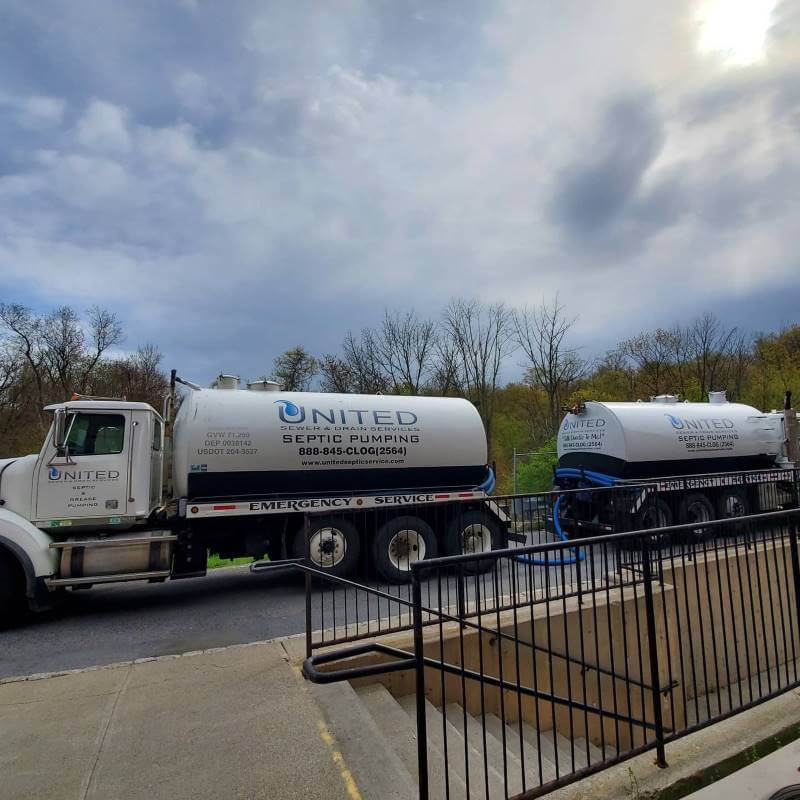
Waste decomposition is the cornerstone of septic system function. When waste enters your septic tank, it needs to break down properly to prevent buildup and system failure. This process relies on a delicate balance of bacteria and other microorganisms naturally occurring in the tank.
These beneficial bacteria work tirelessly to break down solid waste, converting it into liquids and gases that can be safely released into the drain field. Without proper decomposition, your septic tank would quickly fill up with solid waste, leading to backups, overflows, and potential health hazards.
Understanding Maintaining Proper Waste Decomposition
Your septic tank is more than just a holding container for waste. It’s a complex ecosystem teeming with life. The bacteria in your tank are the unsung heroes of waste decomposition, working 24/7 to keep your system running smoothly.
These bacteria thrive in an anaerobic environment, meaning they don’t need oxygen to survive. They feed on the organic matter in your waste, breaking it down into simpler compounds. This process not only reduces the volume of solid waste but also helps prevent clogs and blockages in your system.
Factors Affecting Waste Decomposition
Several factors can impact the rate and efficiency of waste decomposition in your septic tank:
Temperature
Bacterial activity is temperature-dependent. In Middletown’s climate, you might notice slower decomposition during the colder months. This is normal, but it’s important to be mindful of your water usage during these times to avoid overloading the system.
pH levels
The acidity or alkalinity of your tank can significantly affect bacterial growth. Ideally, your tank should maintain a neutral pH between 6.8 and 7.6. Extreme pH levels can kill off beneficial bacteria, slowing down the decomposition process.
Oxygen levels
While the main bacterial population in your tank is anaerobic, some aerobic bacteria near the surface of the waste layer can help with decomposition. Proper ventilation of your system helps maintain this balance.
Water usage
Overloading your system with too much water can disrupt the settling process and wash out beneficial bacteria. This is why it’s important to spread out your water usage throughout the day.
Common mistakes that hinder waste decomposition
Many homeowners unknowingly engage in practices that can harm their septic system’s ability to decompose waste effectively. Here are some common mistakes to avoid:
Using harsh chemicals
Pouring bleach, drain cleaners, or other harsh chemicals down your drains can kill off the beneficial bacteria in your tank. Stick to septic-safe cleaning products and avoid flushing any chemicals down your toilets or drains.
Flushing non-biodegradable items
Items like wipes, feminine hygiene products, and even some types of toilet paper don’t break down easily in septic tanks. They can accumulate and cause blockages, reducing the efficiency of waste decomposition.
Neglecting regular pumping
Over time, even with proper decomposition, some solid waste will accumulate at the bottom of your tank. Regular pumping removes this buildup, ensuring your tank has enough room for proper waste separation and decomposition.
Ignoring leaks and drips
Small leaks might seem harmless, but they can add up to a significant amount of water entering your septic system. This extra water can disrupt the settling process and wash out beneficial bacteria.
Best Practices for Maintaining Proper Waste Decomposition
To keep your septic system running smoothly, follow these best practices:
Schedule regular inspections and pumping
Have your system inspected by a professional at least every three years. They can check for any issues and determine if pumping is necessary. For most households in Middletown, pumping every 3-5 years is sufficient.
Be mindful of water usage
Spread out your water usage throughout the day. Fix any leaks promptly, and consider installing water-efficient fixtures to reduce the load on your septic system.
Use septic-safe products
Choose cleaning products labeled as septic-safe. These are designed to be less harmful to the beneficial bacteria in your tank.
Properly dispose of grease and oil
Never pour grease or oil down your drains. These substances can solidify in your tank, creating a layer that hinders proper decomposition.
Maintain your drain field
Keep trees and deep-rooted plants away from your drain field. Their roots can infiltrate and damage your system. Also, avoid parking vehicles or placing heavy objects on the drain field, as this can compact the soil and reduce its effectiveness.
The Role of Enzymes and Additives in Waste Decomposition
Many products on the market claim to enhance waste decomposition in septic tanks. While some of these products can be beneficial, it’s important to approach them with caution.
Natural enzymes
Enzymes are proteins that catalyze chemical reactions. In septic systems, they can help break down complex molecules into simpler forms that bacteria can more easily digest. Some septic-safe cleaning products contain natural enzymes that can aid in waste decomposition.
Bacterial additives
These products contain concentrated forms of the same types of bacteria naturally present in your tank. They can help restore bacterial populations after a system has been stressed, such as after using antibiotics or harsh chemicals.
Chemical additives
Be wary of chemical additives that claim to “clean” your septic tank. These can often do more harm than good by disrupting the natural bacterial balance in your system.
The Impact of Household Habits on Waste Decomposition
Your daily habits can have a significant impact on your septic system’s ability to decompose waste effectively. Here are some areas to consider:
Laundry habits
Doing all your laundry in one day can overwhelm your septic system with too much water. Instead, spread out your laundry throughout the week. Also, choose phosphate-free detergents to avoid upsetting the pH balance in your tank.
Garbage disposal usage
If you have a garbage disposal, use it sparingly. Food waste can increase the solid load in your tank and may not decompose as quickly as other organic matter.
Water conservation
Installing low-flow fixtures and being mindful of your water usage not only helps the environment but also benefits your septic system. Less water means less stress on your system and more efficient waste decomposition.
Seasonal Considerations for Waste Decomposition
Living in Middletown means dealing with significant seasonal changes, which can affect your septic system’s performance:
Winter care
During cold winters, the decomposition process can slow down. Avoid compacting snow over your drain field, as this can inhibit proper drainage. If possible, let the snow accumulate naturally over your system to provide insulation.
Spring thaw
As the ground thaws in spring, be alert for any signs of system stress. The extra groundwater can put pressure on your system, potentially leading to backups or slow drains.
Summer maintenance
Summer is an ideal time for septic system maintenance. Schedule your inspections and pumping during this season when the ground is easiest to access.
Fall Preparation
Before winter sets in, have your system inspected and address any issues. This can help prevent problems during the colder months when repairs can be more challenging and costly.
Professional Maintaining Proper Waste Decomposition
While there’s much you can do as a homeowner to maintain proper waste decomposition, professional maintenance is crucial for the long-term health of your septic system.
Regular inspections
A professional can spot potential issues before they become major problems. They can check the levels of solid waste in your tank, inspect for leaks, and ensure all components are functioning correctly.
Pumping services
Professional pumping removes the accumulated solids from your tank, restoring its full capacity for waste decomposition. The frequency of pumping depends on your household size, water usage, and tank size.
System upgrades
As technology advances, there may be opportunities to upgrade your system for more efficient waste decomposition. A professional can advise you on the latest innovations that might benefit your specific situation.
Troubleshooting Common Waste Decomposition Issues
Even with proper maintenance, you might encounter issues with waste decomposition. Here are some common problems and their potential solutions:
Slow drains
Slow drains can indicate that waste isn’t decomposing quickly enough. This could be due to a full tank, clogged pipes, or issues with the drain field. Start by reducing water usage and if the problem persists, call a professional.
Foul odors
Strong, persistent odors around your drain field or near your home could signal problems with waste decomposition. This might be due to a full tank, blocked vents, or a system backup. Don’t ignore these smells – they often indicate a serious issue.
Lush vegetation over the drain field
While it might look nice, unusually lush or fast-growing vegetation over your drain field can indicate that the system is releasing too many nutrients. This could mean that waste isn’t being properly decomposed in the tank.
| Issue | Possible Cause | Solution |
|---|---|---|
| Slow drains | Full tank, clogged pipes, drain field issues | Reduce water usage, professional inspection |
| Foul odors | Full tank, blocked vents, system backup | Professional inspection and pumping |
| Lush vegetation over the drain field | Excess nutrients, improper waste decomposition | Professional inspection, possible system upgrade |
The Environmental Impact of Maintaining Proper Waste Decomposition
Maintaining proper waste decomposition in your septic system isn’t just about keeping your household plumbing running smoothly – it also has significant environmental implications:
Groundwater protection
A properly functioning septic system helps protect local groundwater from contamination. When waste decomposes effectively in your tank, harmful bacteria and nutrients are removed before the water enters the surrounding soil.
Soil health
The drain field of a well-maintained septic system can benefit the surrounding soil. As properly treated wastewater percolates through the soil, it can add nutrients and moisture, supporting plant growth.
Reduced energy consumption
Efficient waste decomposition means less frequent pumping and fewer repairs. This translates to less energy used for maintenance and a lower carbon footprint for your household.
| Environmental Aspect | Impact of Proper Waste Decomposition |
|---|---|
| Groundwater | Protection from contamination |
| Soil | Enhanced nutrient content and moisture |
| Energy Consumption | Reduced need for maintenance and repairs |
Future Trends in Maintaining Proper Waste Decomposition Technology
As we look to the future, several exciting developments are on the horizon that could revolutionize waste decomposition in septic systems:
Advanced bacterial strains
Scientists are developing more efficient bacterial strains that can decompose waste more quickly and thoroughly. These could be introduced to septic systems to enhance their performance.
Smart monitoring systems
New technologies are emerging that allow real-time monitoring of septic system performance. These systems can alert homeowners to potential issues before they become serious problems.
Alternative treatment methods
Research is ongoing into alternative methods of waste treatment that could be applied to home septic systems. These include advanced filtration systems and even small-scale anaerobic digesters that can produce biogas from waste.
Conclusion
Maintaining proper waste decomposition is crucial for the health of your septic system and the environment. By understanding the factors that affect waste decomposition and following best practices, you can ensure your system functions efficiently for years to come.
Remember, your septic system is a complex ecosystem that requires regular care and attention. Don’t hesitate to seek professional help when needed, and always prioritize practices that support the natural decomposition process in your tank.
By taking good care of your septic system, you’re not just protecting your property – you’re also contributing to the health of Middletown’s environment. With proper maintenance and a little know-how, you can keep your septic system running smoothly and efficiently, decomposing waste as nature intended. For more information, you can visit our website or contact us.

